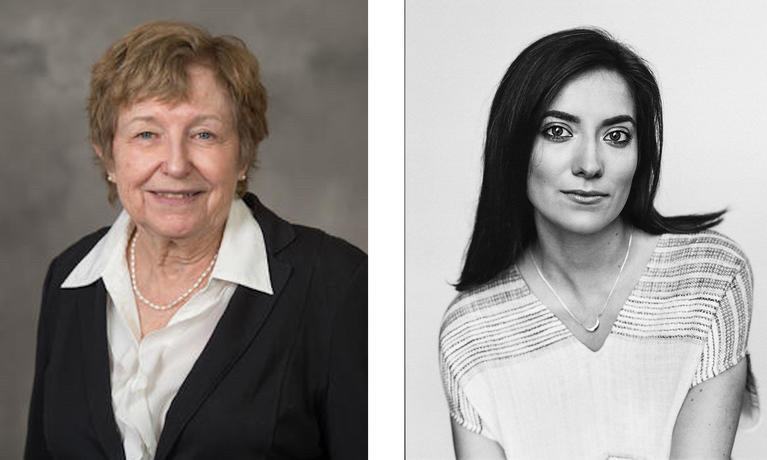
UM-Dearborn’s Commission for Women will host the 40th Susan B. Anthony Campus and Community Awards next month. The longtime campus tradition celebrates those on campus and in the community who advocate for equality, equity and parity.
While the 40-year milestone is associated with making it over the hill, CFW Chair Eva Gogola said there still is more climbing to do.
“We have come a long way, but we are not done,” said Gogola, who also chairs the Susan B. Anthony Award dinner. “Looking nationally, there’s a pretty large disparity in pay. There are still questions on who is in charge of our bodies. There’s still inequity at top levels. But there are people here who are working hard to make our campus and community a more inclusive place. And that should be celebrated.”
Gogola said the annual event also honors the nearly 45 years of advocacy work done by the Commission for Women, the organization behind the annual event.
Noticing an absence of women and minorities on campus-wide decision-making boards, 12 women organized and established—independent, but recognized by the university—the CFW in 1974 to advocate for and create change so that an employee’s worth focused on skills and experience, not something like gender.
“Standing together, their voices were heard,” Gogola said.

The awards dinner will bring Gretchen Whitmer to Fairlane Center North on April 3.
The 2018 campus award recipient is Reading and Language Arts Associate Professor Martha Adler. Her commitment to education and professional guidance to staff, students and faculty earned her the honor. “Personally, my life has changed for the better because she has chosen to invest her time and energy in helping me to achieve my goal of earning tenure,” said Danielle DeFauw, associate professor of education. “She has changed my life, and because of her leadership and mentorship, I see more possibilities for my own future.”
This year’s community award winner is Sophia Kruz, a filmmaker and director of Little Stones, an award-winning documentary that unites the narratives of four women around the world using art to create positive change in their communities.
To help people see the possibilities for the future and to promote and unify for positive change are among the reasons the organization’s work began on campus.
Linda Ellis Brown, who actively served on the CFW for 35 years, said the organization gave her support and guidance during professional crossroads.
Brown, who started on campus in the mid 1970s as a systems analyst and retired as associate vice chancellor for enrollment management and student life and registrar in 2013, had a successful career. But it wasn’t without struggle.
She recalled the strain of being the only woman around the Council of Deans’ table. She also recalled the time when she received a low salary offer—based on her husband’s higher salary—during an interview. Brown excused herself, left the room and found CFW founding member Elnora Ford, who was then administrative assistant to the provost, to share her concern.
“When I told her what happened, Elnora looked at me and said, ‘Go back in there and ask for your money!’ She confirmed that what had happened to me was wrong,” Brown said. “When I went back in, I think they saw the fury in my face. The personnel director said, ‘Mrs. Brown, we want to rethink that.’ Then I was given a stronger and correct offer.
“That’s the power of the Commission; that’s the power of lifting each other up when injustice works to weigh you down.”
Roma Heaney and Susan Cushnier said the CFW also serves to remind. Cushnier, who retired in 2017 as the SOAR program director, and Heaney recalled one of their favorite Susan B. Anthony Awards speakers—a woman who spoke about her 1950s and 1960s activism and the events that led her to take a more vocal role.
“She walked up there in a housedress, looking very reserved, but then got up to the mic and rocked the place,” said Heaney, who retired as UM-Dearborn’s director of institutional research in 2016. “She told us about things we had only heard about or vaguely experienced, but kind of forgotten. She talked about how you had to get your husband’s permission to have credit cards. And how you were forced to quit your job—she had to leave the teaching profession—when you became pregnant. It was a good reminder on why advocates and organizations like the CFW are important.”
Gogola said the Commission for Women will continue to provide support; for example, CFW awards several professional development, educational and leadership grants each year. The group will serve as a reminder that change still needs to take place. And the CFW will celebrate and promote the people—regardless of gender identity—who advocate for equality.
“We are thankful for the advocates in the past, and for those who continue to carry the torch and shine light on these important issues,” Gogola said. “Empowerment is not just finding your voice, it’s using that voice to create meaningful dialogue and positive change.”





